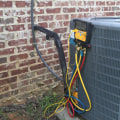Accurately determining the size of the air conditioner you need for your home requires a few calculations. First, you must calculate the square footage of your house and multiply it by 20 to get the BTUs required. Every 12,000 BTU is equivalent to one ton. Using a calculator, an alternating current of 2.5 to 3 tons should work with an 80,000 BTU furnace.
However, this depends on all the factors taken into account in the calculator. If your split system includes central air and a gas oven, the furnace size will range from 45,000 to 135,000 BTU. Don't forget to include the square meters of the rooms that are connected without a door, since the window unit will also cool that area. It is essential to buy the right size air conditioner for your needs in order to be comfortable both physically and financially. Using an air conditioner on a hot day can make temperatures more bearable, but only if it is large enough to cool the area you want.
To find out what size air conditioner or heat pump you need, as well as the estimated size of the furnace your home will also need, simply locate the size of your house. Once all data has been entered into the calculator, it will analyze the numbers and give you the results: the size of the BTUs of the air conditioner or heat pump and oven, if they are included in your air conditioning system.
In addition to this, there is a formula that can be used to determine the required tonnage of a central air conditioning system.
The average lifespan of an air conditioning system is between 15 and 25 years, but it can be extended by 5 years or more with regular maintenance and minor repairs as needed. Every home is different and the only accurate way to know what size air conditioner you need is to ask a professional to visit your home and calculate the cooling load. Air conditioners are measured in British thermal units (BTU) or British thermal units per hour (BTUh). A qualified professional will select the correct size of air conditioning unit or system depending on climate zone, square meters of house, state of insulation and degree of sunshine in your area.Square footage is one of the first factors to consider when choosing an air conditioner size. To ensure that you get an air conditioner that is suitable for your home's needs, it is important to consult with an expert who can accurately calculate your cooling load and recommend a unit that meets your requirements. This will help you save money in energy costs while keeping you comfortable during hot summer days.

